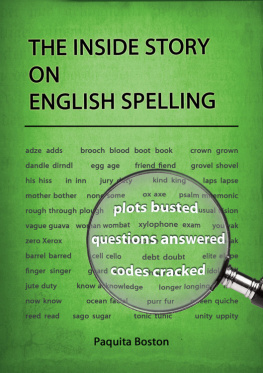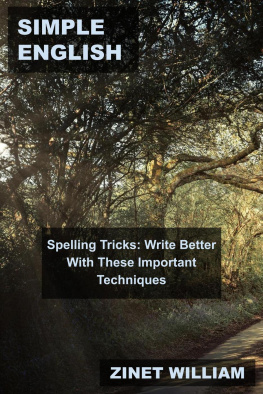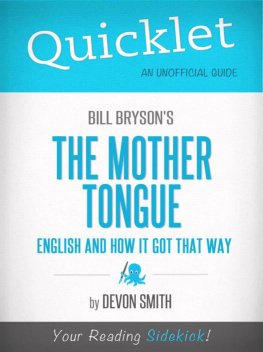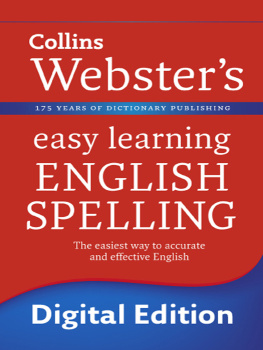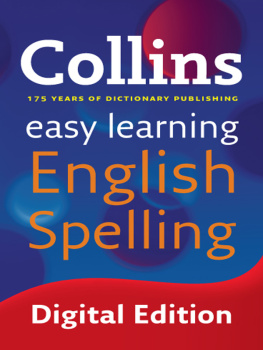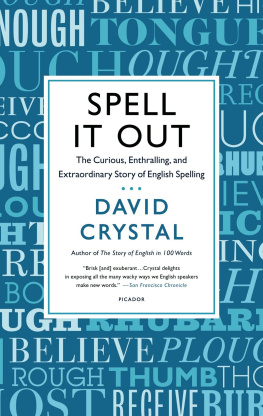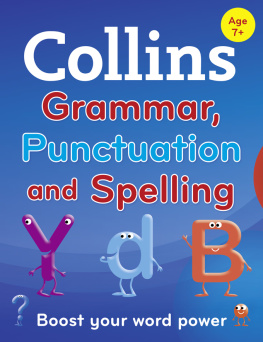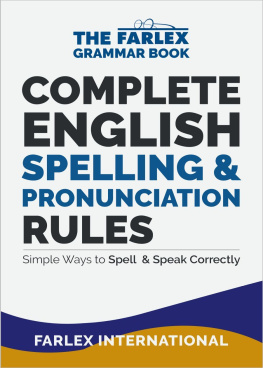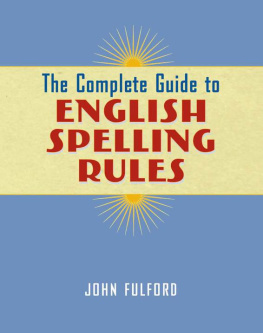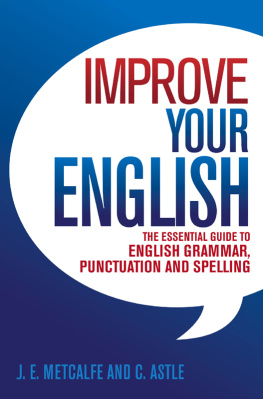Copyright 2013 Paquita Boston
ISBN: 978-0-9756744-3-7 (pbk)
ISBN: 978-0-9923909-6-9 (ebk)
Author
Paquita Boston
Editor
Philippa Hadlow
Cover and layout by Frederic Langer
langer.frederic@gmail.com
Photo by Ben Funnekotter
This edition published 2013 by
DoctorZed Publishing
10 Vista Avenue, Adelaide, S A 5072
www.doctorzed.com
Printed by
Digital Print Australia
135 Gilles Street, Adelaide, S A 5000
www.digitalprintaustralia.com
All rights reserved. No part of this publication may be reproduced, stored in a retrieval system or transmitted, in any form or by any means, without prior consent of publisher.
For anyone and everyone
who has ever asked
Why is it spelt like that?
INTRODUCTION
David Crystal is a language expert. He says there is not much help out there for teachers trying to work out how to teach spelling and manage its variations, to find interesting ways to present the facts. Others wishing to master spelling have a tough time of it too, because there is a veritable dearth of good analyses and presentations about English spelling. Lynne Truss attracted millions to read about punctuation in Eats, Shoots & Leaves, so how about spelling? Who will be the Lynne Truss of spelling, I wonder? Mr Crystal asks, on page 169 of his book The Fight for English.
Well, maybe I fit the bill. First I sorted 30,000 words from easiest to decode to hardest, grouped into spelling patterns. Then I found a rule for each pattern and listed all the words which follow that rule or system. I also listed the rebels, which are the words which break the pattern, disobey the rules. Then I found their various reasons for breaking rules. Very few were found to be outright rascals my label for rebels without a reason. The spelling of 30,000 English words took another 200,000 words to explain. Im told such a big book is very daunting, daunting to teachers, but not when delivered to little children, because it just starts at the beginning of literacy, with little words and simple patterns. Just like any good game, one can enjoy reading and writing without knowing all the rules straight away. Children are never daunted by the long road ahead if they are enjoying the journey.
My big book, Reading with Rules, 30,000 Words Listed with Spelling Rules, Reasons and Rebels, was my apprenticeship. The following book is what I call my chat show about spelling. When people ask me about my spelling discoveries I find myself chatting away about one aspect or another of spelling. So I have formalized these chats into chapters.
My enthusiasm stems from a desire to explain spelling, by revealing the rules which govern spelling. If we know where a rule comes from, what it does, or why its useful, we are more likely to use and appreciate it, and also to remember it.
Yes, there are rules! My husband, Chris, sometimes says, Even if there are rules to spelling, there are too many exceptions to make them worthwhile.
I hope that when he reads this he will see that there are very few exceptions to each rule, often far fewer than the exceptions to rules of the road. For instance, seat belts are compulsory, except if the driver is reversing, or is pregnant, or is over a certain age, and except in public transport, but not always. Oh, and except if the vehicle was manufactured before seat belts were mandatory, like Chriss 1954 Land Rover. My father always made us let down windows before crossing flooded rivers, to escape if the car slipped off the ford. Im sure a good case could be made for undoing seat belts, too. All these many exceptions to the seat belt rule vary from state to state within Australia, and yet everyone still considers the seat belt rule well worthwhile.
We are used to the complexity of everyday rules. After all, courts are held not just to decide if a rule has been broken, but also to decide if exceptions to the rule can be made, if allowances can be made for exceptional circumstances, or if earlier decisions have set a protocol for exceptions.
Those who scoff at English spelling by saying it has no rhyme or reason, sound just like people who look at a game of football and see nothing but a tangle of limbs and a ball. Both spelling and football need explaining to be enjoyed.
More than that, each code of football needs explaining, but for all the rules involved, and all their many exceptions, its not a big burden. Yes, rules for sport do involve exceptions, e.g. no ones allowed offside in hockey, except the goalie; every cricket player bats in an innings, except if the captain declares. Its worth looking at the forty-two rules of cricket and all their allowable variations in exceptional circumstances to see just how much the human brain is capable of grasping and holding and acting on. Australian spectators ring radio stations to debate the very finest points of sports law, involving nuances of a degree rarely perceived in a court of common law.
My point is that no one likes to play a game without rules, that everyone I know finds learning the rules of sport and their exceptions no great hardship, and also, spectators find the game uninteresting without them. Spellings the same to me why should a student have to spell without direction, to write down and read out words without being told the rules and the exceptions of spelling? Explanations of where the rules come from, what they are for and how they differ from those of other languages, make spelling easier to follow, easier to learn and far more enjoyable.
Besides, teachers are meant to encourage curiosity and teach logical thinking, from day one i.e. when a child starts learning to read and write. Teachers cannot fulfil this prime duty unless they can answer wisely every time a student asks, Why is it spelt like that?
Chapter One A Class Plot?
Why is English so hard to read and write? Why do we spend years of school time learning to spell? Is it true that other languages are much easier to read and write?
A quick answer is that the spelling of most European languages has been simplified, made easier to read and write, but not English. We must judge for ourselves how and why this came about. I hope the rest of this chapter helps you decide if English spelling is the product of a class plot, or a victim of history.
English spelling was not simplified but it was unified, because spelling was reduced, from many different ways to spell each word, to just one way for each word. Lets begin at the beginning: writing has its roots in drawing and painting and sculpting and carving.
Long ago, people all over the world began turning their stories into pictures. They carved and painted them on cave walls and later on the walls of pyramids and houses. As houses grew taller, with added floors, more and more rows of paintings and sculptured figures were added. The latter were chipped in to walls or were complete statues, along roof tops. These were our first recorded stories, or historia as the Romans called them. We still call each floor of a building a storey, with an extra letter, E, to differentiate it from a story told on paper, or by word of mouth. No matter how tall a store house may be, its storeys are named after what was on the outside, not the inside, not the stores.

